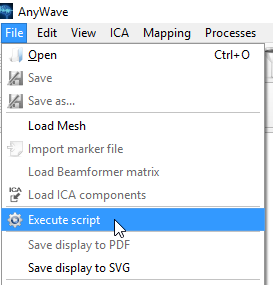Difference between revisions of "AnyWave:H2"
From WikiMEG
(→A script example) |
(→A script example) |
||
| Line 32: | Line 32: | ||
h2.matlabFile = "H2output_HP15Hz"; | h2.matlabFile = "H2output_HP15Hz"; | ||
anywave.runProcess(h2, fi); | anywave.runProcess(h2, fi); | ||
| + | } | ||
</syntaxhighlight> | </syntaxhighlight> | ||
Revision as of 10:18, 27 March 2017
How to use the plug-in
How to script the H² computation
AnyWave allows to script some compatible plug-ins (and H² is compatible) in order to batch the computations of several data sets.
The script file is a JavaScript file that will be executed by AnyWave this way:

A script example
In our example, we have to compute the H² on three data sets. We first have to select the channels, and one or more time selections for these channels.
To do so, we previously prepared a montage file (that will inform about what channels to use in the computation) and for each data set we also prepared a marker file containing the time selections.
For each data sets, we saved a montage and a marker file along with the data file.
var h2 = anywave.getProcess("H2"); if (h2) { // set process parameters h2.windowSize = 4; h2.step = 2; h2.maxLag = 0.1; h2.saveToMatlabFile = true; // process will output data to Matlab file. h2.matlabFile = "H2output_HP15Hz_LP45Hz"; // defines the Matlab base file name. // set files as input var fi = anywave.getFileInput(); // only take .eeg files as input fi.addFileExtension("*.eeg"); // Define a base folder where to look for data. All sub folders will be explored. fi.setRootDir("d:\\data\\H2"); // Defining how to filter data before processing them. fi.setFilters("seeg", 45, 15); // run the H2 process on data anywave.runProcess(h2, fi); fi.setFilters("seeg", 0, 15); h2.matlabFile = "H2output_HP15Hz"; anywave.runProcess(h2, fi); }